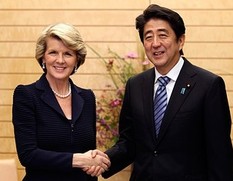 Source: i4u.com
Source: i4u.com As Hugh White observed on Tuesday, Abbott’s rhetoric with regard to Japan is risky as it may prompt retaliation by Beijing against Australia in the form of a freeze on negotiations for an FTA and the cancellation of any ministerial visits to Australia. It would be difficult to believe that the Abbott government has embarked on its current path without taking this into consideration, with the conclusion being that any potential difficulties with China will be offset by the shifting nature of economic relations in the region. China could certainly damage Australia’s economy by sharply dropping its mineral imports and cancelling investments in Australia, but this presumes that no other country would want to benefit from China’s absence. Moreover, to launch punitive actions against Australia for drawing closer to another democratic state would reflect badly on China, it would reveal too much of China’s own strategy for building influence in the region and further abroad and work against China’s long-term interests.
Hence one gets the feeling that China will allow Abbott to continue his support for Japan so long as this doesn’t translate into an active attempt to intervene in China’s territorial dispute with Japan. China is well aware of the trend among conservative Australian governments to support pro-US nations abroad, and Japan is one of the most traditional of US allies in the region. As Australia is not in a formal alliance with Japan, the risk that Australia might join the US in defending Japanese interests is less of a concern for China so long as this situation continues.
As for Australia’s own reaction to Bishop’s comments, they are likely to be positive given the ties shared between Australia and Japan and the degree of trust exhibited by the Australian population towards Japan. The possibility of having Japan involved in regional exercises has been actively supported by commentators in Australia, as has the potential for Japanese involvement in the future submarine program.
The Abbott government has outlined its foreign policy position with relation to Japan, and is waiting for the Chinese response. Foreign Minister Bishop has said that Australia wants a deeper relationship with China while addressing the media in Japan, a message the Chinese will interpret as a challenge to obtain the trust of the Abbott government. Given the concern in the region regarding China’s intentions, Abbott has apparently gambled that China will not risk alienating Australia for the sake of its argument with Japan and so has taken the initiative to promote Australia-Japan ties. It’s an interesting strategy, but one which will very much depend on Abbott’s nerve.
 RSS Feed
RSS Feed